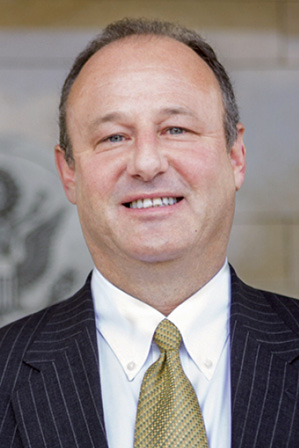Foreign Service Duty
President’s Views
BY ERIC RUBIN

While teleworking and social distancing for the past month along with so many of you, I have been pulling books off my shelves. One of the books I opened was Theodore H. White’s In Search of History. This is the story of a great American journalist who witnessed some of the most important developments of the 20th century.
White writes passionately about what happened to the United States after World War II, as the Cold War became our focus and McCarthyism took hold in our political culture.
White’s thesis is that the destruction of the team of Foreign Service Asia experts—who were assailed as apologists for Mao’s China and “fellow travelers” in communism’s relentless advance—left the State Department desperately unprepared for the coming conflict in Southeast Asia, and contributed directly to the debacle of our engagement in the Vietnam War.
AFSA is 96 years old this year. We started as the professional association of the U.S. Foreign Service, and we remain that, fervently. But since 1973 we have also been the labor union and official bargaining agent of the Foreign Service.
In 1973, some said that the Foreign Service, as an elite corps of professionals, did not need a labor union. Others advocated for the Service to join one of the big federal unions alongside other federal employees.
The argument that won the day was that the Foreign Service is unique. Its members need representation and advocacy, but that has to happen in a nonpolitical and nonpartisan framework. Our members could not adequately be represented within a huge politicized federal union, but also could not rely on management goodwill without someone to advocate for them. And that’s where AFSA came in.
Almost 50 years later, we have a strong and vibrant association that represents more than 80 percent of Foreign Service members in six agencies, voluntarily. We have held true to the goal of nonpartisan, nonpolitical representation of our members, and to our dual role as the professional association of American diplomats and as the legally recognized bargaining agent for everyone in the Foreign Service.
I hope the past year has demonstrated AFSA’s value and importance as a bulwark defending our members. We have raised and spent tens of thousands of dollars covering legal bills for members who were subpoenaed as witnesses in the impeachment hearing. And now, in the midst of the COVID-19 crisis, we are doing everything we can to support our members in Washington and in the field who are dealing with excruciating challenges.
Our colleagues who have been laboring long and hard to bring Americans home in the midst of the pandemic make us proud. This is the Foreign Service. This is who we are and what we do. It’s called service. The oath we took when we joined is, I believe, sacred to us all.
Thinking again about Theodore White’s book, the importance of courage in the face of adversity is clear. All of us must fight for our people, and for our profession and what it means. Diplomacy is the chief alternative to war.
Reflect on these sobering words from White:
“The ultimate impact of McCarthy on American diplomacy, and thus on the world, came many years later, in Vietnam. … The purging ended with a State Department full of junior diplomats, who knew their future career was pawn to political passion at home, who knew that prediction of a Communist victory would be equated with hope for a Communist victory, and who learned to temper their dispatches of observation in the field with what their political superiors wished to hear.
“No field-grade American diplomat, in the long period between 1964 and 1975, had the courage flatly to predict the potential for disaster in Vietnam. Many recognized that potential, but none dared say it aloud or in print until it was too late. They reported what their political masters wanted to hear.”
May we consider those words a cautionary tale as we face the challenges that confront us now. And may we not shy away from our critical role, to stay true to our mission and to tell it like it is, in service to our country and to our fellow citizens.

